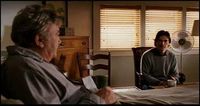Big Phish
Big Phish is a 2003 blockbuster film with visual effects, acting, direction, and production by Tim Burton, mastermind of such children-scaring fantasy-horror pictures as The Nightmare Before Christmas and Bill and the Giant Belch.
It is about a rustic-accented, endearing man in his twenties who sets about scamming people for miles around out of thousands of dollars. He accomplishes this by hyponotising them all into believing the world is full of storybook characters, then robbing them all in ways that would feel proper in the fantasy he creates. The film's shtick during its run in theatres was that after each showing, every single solitary member of the audience found their wallets missing.
Critics ostracised the film for being nonsensical and riddled with unforgivable plot holes. The film also received mixed reception in the movie-going public, and a class action lawsuit was later filed.
Plot[edit | edit source]
Warning: The following text might contain spoilers. This makes the article more aerodynamic, and thus more maneuverable at high speeds. Take caution and carry a first-aid kit at all times if you don't know that Luke, Darth Vader is your father, Dimentio was manipulating everything from behind the scenes so he could claim the Chaos Heart and use it to become all-powerful, Sirius Black dies, the Bride's real name is Beatrix Kiddo, and her daughter is alive, Creedy kills Sutler and is in turn killed by the mortally wounded V, Saturos and Menardi aren't evil, the Stormbreaker computers release a deadlier, genetically modified type of smallpox when activated, Sasuke eventually kills Orochimaru, Charlie Brown never talks to that red-headed girl, R + L really does = J, and Soylent Green is PEOPLE!!! |
The movie is a series of epistles, each more urgent in tone than the last. Reviewers recommend wearing spiralled sunglasses whilst reading, as a precaution against Chapter 11 bankruptcy and death:
After Bloom flees Africa (on a fishing trawler owned by Neptune, according to him) his bulk mailings grow more touching and romantic:
From small hamlets to burgeoning cities, he has never lived in a place unmolested by creatures from story books:
Before long, Bloom learns that he has left a son behind during his travels through eastern Europe. They correspond by e-mail, but young Jonathan Bloom is beset with the task of sorting out his father's sincere e-mails from the relay-spam junk sent by the same address. This clouds the waters of their relationship, and for 10 years they do not correspond again.
His spam days long finished, Edward Bloom e-mails his son to tell him his father is dying. Pushing aside his memories of the chain letters, fake casinos, and phishing schemes, Jonathan flies to Yukon territory, where his father lives in refuge from the authorities.
His son questions him in confusion on why he is hiding out in such a place. A habitual liar, Bloom responds with a tall tale in which he leads a tribe from the USSR over a temporarily risen land bridge and through Alaska. Upon hearing this, his son once again becomes enraged.
However, seeing his father in the hospital, Jonathan comes to identify with the scam artist's ways, and agrees to try it himself. What follows is an on-screen epidemic of sleaze, in which Bloom's son spins the greatest confidence trick of all time, sending wave after wave of nauseating lies at the audience.
The movie ends with a muted trumpet and the words, "Check your purse."
Reviews[edit | edit source]
“One thumb up and one thumb down.” – Roger Ebert “Big Phish was boring, depressing, and it cheated me out of my life savings. Three stars.” – The Weekly Times “Yes, we get it. What we thought was fantasy turned out to be real. Seen it all before.” – The Anarchist Star “Performance art at its finest. Would buy again.” – Extortion Revenue Streams Ltd. “Burton's action-empty offering butchers the summer blockbuster form. Would have been better released over Christmas.” – Michael Medved
Lawsuit[edit | edit source]
The reaction to the film grew to unprecedented levels in the fall of 2003. Doctors confirmed the film caused irreparable brain damage. With the autumn months came cold, aggravating the state of the newly mentally ill and busted movie-going public. No fewer than two slasher crossover films during that season made the situation still worse, until riot control was necessary.
During the ensuing lawsuit and its fifteen joiners, two distinct groups entered the open:
- The art liberals - A group composed largely of left-wing cat-lovers. They hailed the film as dramatic, free-form, real-world art. According to them, the mind-bending subliminal messages embedded in the vignettes of cute bunny rabbits, fast-growing grass, and broken fortunes simply involved the audience further in the film. Tim Burton championed this view himself, as of course his production company, Moaning Tricycle, was having its pants sued off.
- The lynch mob - Dulled by the bustle of everyday life, the lynch mob had no patience with revolutionary new forms of convulsant cinema. They simply wanted their money back, and to see Tim Burton and his associates hanged.
The case heard no fewer than fifty impassioned speeches by deranged lunatics, including an appearance by Danny DeVito, who had been tricked into acting like a rabid dog both on and off-screen. The suit was also decisive of recent politics, as three supreme court judges were felled during it.
Aftermath[edit | edit source]
In the end, the UK courts found in favour of the class in the sum of ₤1.8 million. The debt was so crushingly heavy that not even the strongest bankruptcy could support it. So Atlas the Giant shouldered the weight of the great debt. Edward Bloom could be seen by his left foot, looking up and winking. They both strode off into the sunset, enormous bags of cash under Bloom's right arm.

